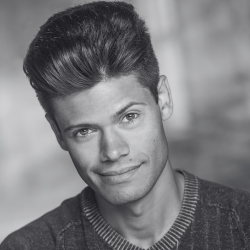Mary’s Wedding promises to pack an emotional punch at Lighthouse Festival Theatre
This summer, Lighthouse Festival’s audiences are advised to BYOK — Bring Your Own Kleenex.
They’ll need them for Mary’s Wedding, which begins previews at the Lighthouse Theatre in Port Dover on July 3. Written by Stephen Massicotte and first produced by Alberta Theatre Projects in 2002, Mary’s Wedding transports audiences to the Canadian prairies of the early 20th century, where a young woman named Mary Chalmers, seeking shelter from a thunderstorm in a barn, stumbles upon a young man named Charles Edwards and has her world turned upside down. The ensuing love story, both epic and intimate, spans continents as Charlie sails off to fight in the trenches of the First World War.
“I liken it more to poetry than I do to your standard text of a play,” said Derek Ritschel, the director of Mary’s Wedding and the artistic director of Lighthouse Festival, in an interview. “Sometimes when a writer writes a show they have all the right ideas, but the rhythm of the lines just doesn’t work. [Mary’s Wedding] is the opposite. It’s the right amount of syllables. It’s the right amount of pace. The scenes change just at the right time. It is, to me, the perfect Canadian play.”
The last time Lighthouse mounted a production of Mary’s Wedding in 2005, Ritschel played the role of Charlie. As the director of this new production, he brings not only a profound understanding of the text but a desire to lean into the sweeping, cinematic nature of the play’s love story.
“I get accused of directing films for the stage all the time,” joked Ritschel. “My style has always been very cinematic.” One example is Ritschel’s vision for the play’s opening, created in collaboration with sound designer Tim Lindsay. “There’s a sequence at the top of the show where we’re going to have audio from the Vietnam War, the Korean War, then World War Two, [then World War One],” explained Ritschel, “to the point where, at the end of the opening sequence, all we’re hearing is the wind in the wheat. We want to slow the audience down to [the world of] the prairies in 1916.”
Ritschel also plans to play with montage and slow motion as a way to capture Charlie’s terrifying experiences at the front.
“What would have been a brief moment in real time, I’m going to slow right down,” Ritschel said. “I’m creating these time pockets.” Ritschel compared the slow motion quality he’s aiming for to his experience of being in a car accident. “The car that drove into me — it took all of 1.4 seconds,” he shared, “but the amount of thought that went through my head in that blip is what I’m going for with Charlie and Mary. The train of events in their storyline is very quick, so I’m trying to create spaces where we can actually breathe and [sit with] thought and memory and love.”
Ritschel’s filmic approach to Mary’s Wedding doesn’t equal hyper-realism. On the contrary, Ritschel wants to embrace the opportunities for play and imagination that theatre offers as a medium. “We’ve gone uber-dream,” he said. “Nothing is what it seems to be. Charlie doesn’t have a gun in our show. It’s a broom.”
At the heart of this production are two incredible emerging actors: Daniel Reale (Charlie) and Evelyn Wiebe (Mary). This is Ritschel’s first time collaborating with both performers.
“There’s something thrilling for me to work with people I don’t know,” he said. “It makes me think about my words a little more, and how I’m delivering a thought. “I kind of hate the term ‘director.’ I like to think of myself as on the outside looking in for [actors] and watching their backs, and saying ‘here’s what I’m seeing.’ [Wiebe and Reale] are so open and so smart, and so willing to say ‘No, Derek, I think it’s this.’ I love it. It challenges me, and I love the energy of young actors and new people.”
Mary’s Wedding will be quite the tonal shift from Lighthouse’s current offering, the madcap mystery farce Murder at Ackerton Manor.
“Ackerton is nuts,” said Ritschel. “The characters are huge caricatures of [murder mystery] archetypes. It’s so absurd and fun and ridiculous. It’s very funny. Then [the audience is] going to get Mary’s Wedding, and it’s going to be the biggest 180 — which I’m loving.
“We always do a show that has some serious heart and drama to it,” he continued. “I something refer to it as ‘the one for the heart.’”
How does Ritschel hope Mary’s Wedding might touch the hearts of Lighthouse audiences and subscribers?
“I hope that people who see Lighthouse as a comedy house will give it a chance,” he said. “What these two fine actors are about to do is going to be something pretty spectacular.”
Mary’s Wedding runs July 3 – 20 at the Lighthouse Festival Theatre in Port Dover, and July 24 – August 4 at the Roselawn Theatre in Port Colborne. You can learn more about the show here.














Can’t wait to see this show!